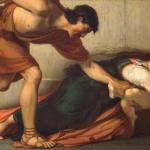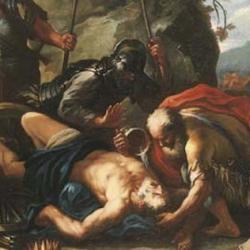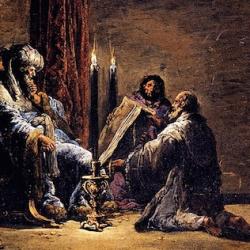The Chronicler leaves out all the juicy stories of David’s career – some of his major battles, his youthful heroism, Saul’s persecution, adultery, murder, household disintegration. David isn’t perfect, but he’s cleaned up enough to join respectable company.
Mark Thronveit asks whether the Chronicler is a “spin doctor.” He acknowledges that the Chronicler has his spin, but he doesn’t think his intent is to whitewash. Rather than depicting a sinless David, the Chronicler shows us a David who knows how to handle sin: “The basis of David’s idealization was not his lack of sin; rather, he was portrayed as one who does sin, but also as one who seeks God, confesses his sin, and claims the promise of forgiveness, thereby enabling the community to see themselves as God sees them, and encouraging them to respond, as had he, in repentance” (381).
On the way to that sound conclusion, Thronveit helpfully summarizes some of the Chronicler’s techniques of characterization. David is portrayed through four central relationships: “David and Israel, David and Saul, David and Moses, and David and Solomon” (375). I’m most interested in the second and third.
For the Chronicler, David is the anti-Saul: “the Chronicler rearranges his source (2 Sam 5:11-23) in order to contrast David and Saul (1 Chr 14:8-17). There, the pattern of Israel ‘in exile,’ drawn in the portrait of Saul’s demise (1 Chr 10), is completely reversed: David’s kingdom was established (14:2), Saul’s had been taken away (10:14); David’s house increased (14:3-7), Saul’s was eliminated (10:6); David inquired of God (14:10,14), Saul had not (10:13-14); David defeats the very Philistines who had defeated Saul and burns the gods before whom Saul’s head had been presented (14:16; 10:8-10)” (378).
The Moses-David typology is pervasive and multifaceted. Thronveit notes the contrast between Kings and Chronicles with regard to Yahweh’s attentiveness to prayer: “In Kings, this warrant comes through God’s promise to ‘Moses, your servant, when you brought our ancestors out of Egypt.’ In Chronicles, the warrant is based upon Ps 132:8-10,1, and appeals to David’s faithfulness regarding the ark” (379).
For the Chronicler, David, not Moses, is the crucial figure in the establishment of Israel’s worship. He organizes the Levites and priests, introducing singers and expanding the role of gatekeepers. Like Moses, he receives the tabnit for the temple from Yahweh and passes it on to David to Solomon. He gathers the plunder that will furnish the house, and, in a new development, he contributes from his own treasure on a massive scale. Remarkably, “David chooses the site for the temple (1 Chr 22:1) despite the Deuteronomic requirement that the site should be ‘the place the LORD your God shall choose’ (Deut 12:5, 11, 14, emphasis added), and, as the previous two verses make clear, that place is not Gibeon, the site of Moses’ tabernacle” (379).
Moses was unable to enter the land, and David is not permitted to build the temple. David’s final charge to Solomon resembles Moses’ exhortation to Joshua, down to the repeated “be strong and courageous.”
This is not to say that Moses disappears from view: “Mosaic authority remains, chiefly with regard to the law. On several occasions, David submits to and implements Mosaic authority (e.g., 1 Chr 15:11-15; 22:12-13), at other times he adapts Mosaic legislation to contemporary circumstances” (379-80). Yet David is elevated to at least an equal status with Moses.
The Chronicler’s typologies aren’t window dressing; they are essential to the purpose of his history, which serves to guide the Israel of the restoration. Each comparison carries a specific message for his first readers: “To a postexilic community looking for identity and meaning, David’s relationship to Israel, as portrayed in the genealogies, confirms that God has a plan that stretches back to Adam. To a community that had experienced exile due to unfaithfulness, as had Saul, David’s seeking God provides a vehicle for restoration. To a community gathered around the temple, not a throne, David’s implementation and adaptation of Moses speaks a word of continuity and relevance. To a community living under Persian domination, without a king, the assurance that it is God’s kingdom encourages them to look for the final fulfillment of that hope” (381).
(Mark A. Thronveit, “Was the Chronicler a Spin Doctor? David in the Books of Chronicles,” Word & World 23: 4 [2003] 374-81.)












